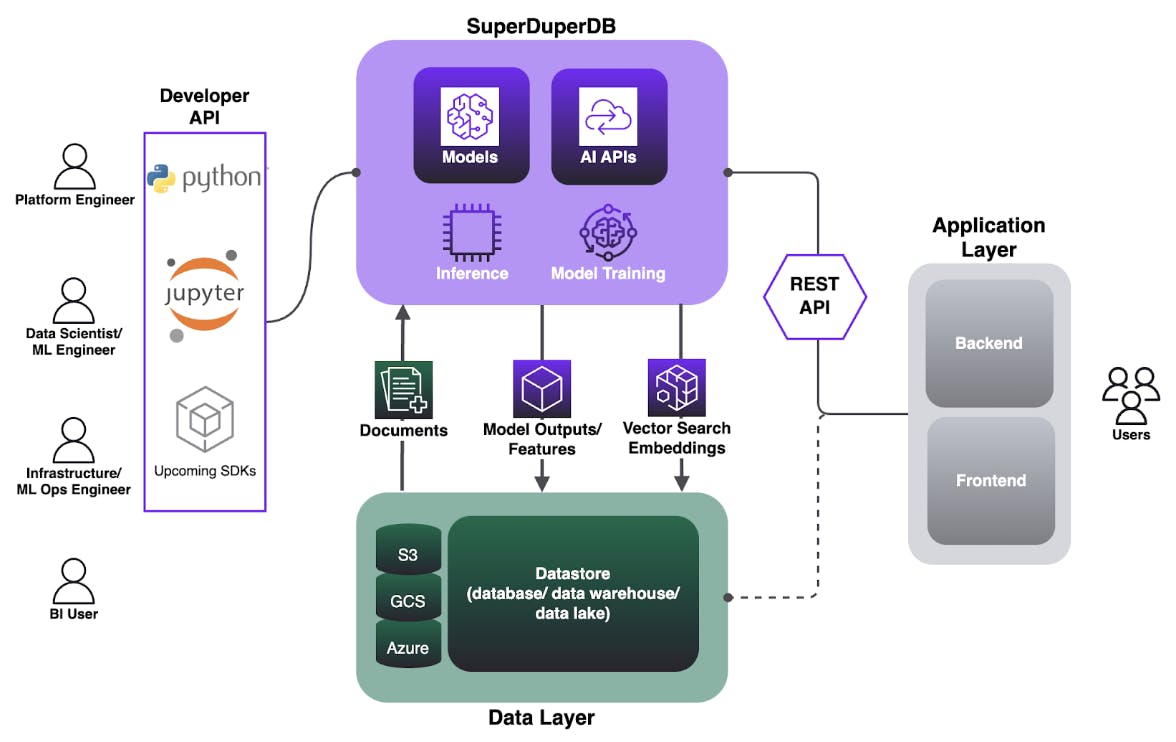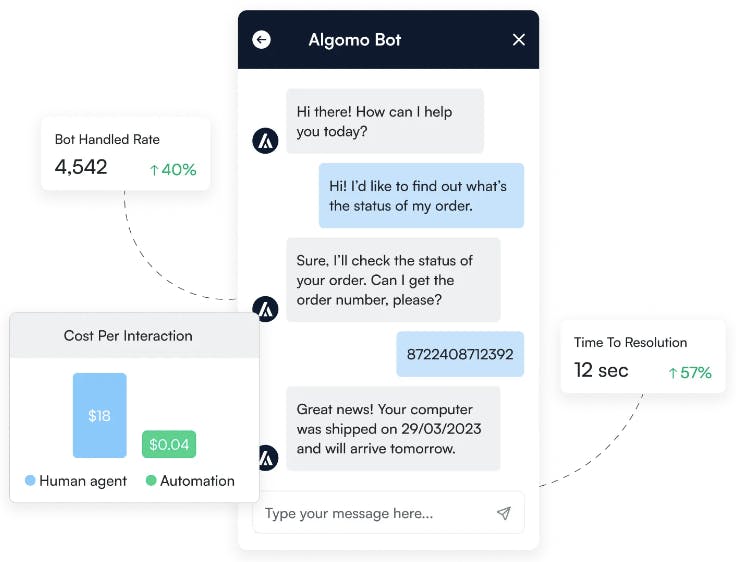Communication mediums are core to who we are as humans, from understanding each other to creating bonds and a shared purpose. The methods of communication have evolved over thousands of years, from cave drawings and scriptures to now being able to connect with anyone at any time via internet-enabled devices. The latest paradigm shift to supercharge communication is through the use and application of natural language processing and artificial intelligence.
In our latest roundup of AI innovators building with MongoDB, we’re going to focus on three companies building the future across three mediums of communication: data, language, and video. Our blog begins by featuring SuperDuperDB. The company provides tools for developers to apply AI and machine learning on top of their existing data stores for generative AI applications such as chatbots, Question-Answering (Q-A), and summarization. We then cover Algomo, who uses generative AI to help companies offer their best and most personalized service to customers and employees across more than 100 languages. Finally, Source Digital is a monetization platform delivering a new era of customer engagement through video and the metaverse.
Let’s dive in to learn more about each company and use case.
Bringing AI to your datastore

SuperDuperDB is an open-source Python package providing tools for developers to apply AI and machine learning on top of their existing data stores. Developers and data scientists continue to use their preferred tools, avoiding both data migration and duplication to specialized data stores. They also have the freedom to run SuperDuperDB anywhere, avoiding lock-in to any one AI ecosystem.
With SuperDuperDB developers can:
-
Deploy their chosen AI models to automatically compute outputs (inference) in their datastore in a single environment with simple Python commands.
-
Train models on their data simply by querying without additional ingestion and pre-processing.
-
Integrate AI APIs (such as OpenAI) to work together with other models on their data effortlessly.
-
Search data with vector search, including model management and serving.
Today SuperDuperDB supports MongoDB alongside select relational databases, cloud data warehouses, data lake houses, and object stores.

SuperDuperDB provides an array of sample use cases and notebooks that developers can use to get started including vector search with MongoDB, multimodal search, retrieval augmented generation (RAG), transfer learning, and many more.
The team has also built an AI chatbot app that allows users to ask questions about technical documentation. The app is built on top of MongoDB and OpenAI with FastAPI and React (FARM stack) + SuperDuperDB. It showcases how easily developers can build next-generation AI applications on top of their existing data stores with SuperDuperDB. You can try the app and read more about how it is built at SuperDuperDB's documentation.
“We integrate MongoDB as one of the key backend datastores for our platform, the PyMongo driver for the app connectivity and Atlas Vector Search for storing and querying vector embeddings”, said Duncan Blythe, co-founder of SuperDuperDB. “It therefore made sense for us to partner more closely with the company through MongoDB Ventures. We get direct access to the MongoDB engineering team to help optimize our product, along with visibility within MongoDB’s vast ecosystem of developers.”
Here are some useful links to learn more:
Conversational support, powered by generative AI

Algomo uses generative AI to help companies offer their best service to both their customers and employees across more than 100 languages. The company’s name is a portmanteau of the words Algorithm (originating from Arabic) and Homo, (human in Latin). It reflects the two core design principles underlying Algomo’s products:

- Human-centered AI that amplifies and augments rather than displaces human abilities.
- Inclusive AI that is accessible to all, and that is non-discriminatory and unbiased in its outputs.
With Algomo, customers can get a ChatGPT-powered bot up on their site in less than 3 minutes. More than just a bot, Algomo also provides a complete conversational platform. This includes Question-Answering text generators and autonomous agents that triage and orchestrate support processes, escalating to human support staff for live chat as needed. It works across any communication channel from web and Google Chat to Intercom, Slack, WhatsApp, and more.
Customers can instantly turn their support articles, past conversations, slack channels, Notion pages, Google Docs, and content on their public website into personalized answers. Algomo vectorizes customer content, using that alongside OpenAI’s ChatGPT. The company uses RAG (Retrieval Augmented Generation) prompting to inject relevant context to LLM prompts and Chain-Of-Thought prompting to increase answer accuracy. A fine-tuned implementation of BERT is also used to classify user intent and retrieve custom FAQs.
Taking advantage of its flexible document data model, Algomo uses MongoDB Atlas to store customer data alongside conversation history and messages, providing long-term memory for context and continuity in support interactions. As a fully managed cloud service, Algomo’s team can leave all of the operational heavy lifting to MongoDB, freeing its team up to focus on building great conversational experiences.
The team considers using MongoDB as a “no-brainer,” allowing them to iterate quickly while removing the support burden via the simplicity and reliability of the Atlas platform. The company’s engineers are now evaluating Atlas Vector Search as a replacement for its current standalone vector database, further reducing costs and simplifying their codebase. Being able to store source data, chunks, and metadata alongside vector embeddings eliminates the overhead and duplication of synchronizing data across two separate systems. The team is also looking forward to using Atlas Vector Search for their upcoming Agent Assist feature that will provide suggested answers, alongside relevant documentation snippets, to customer service agents who are responding to live customer queries.
Being part of the AI Innovators program provides Algomo with direct access to MongoDB technical expertise and best practices to accelerate its evaluation of Atlas Vector Search. Free Atlas credits in addition to those provided by the AWS and Azure start-up program help Algomo reduce its development costs.
Creating a new media currency with video detection and monetization

Source Digital, Inc. is a monetization platform that delivers a new era of customer engagement through video and the metaverse. The company provides tools for content creators and advertisers to display real-time advertisements and content recommendations directly to users on websites or in video streams hosted on platforms like Netflix, YouTube, Meta, and Vimeo.
Source Digital engineers built it’s own in-house machine learning and vector embedding models using Google Vision AI and TensorFlow. These models provide computer vision across video streams, detecting elements that automatically trigger the display of relevant ads and recommendations. An SDK is also provided to customers so that they can integrate the video detection models onto their own websites.
The company started out using PostgreSQL to store video metadata and model features, alongside the pgvector extension for video vector embeddings. This initial setup worked well at a small scale, but as Source Digital grew, PostgreSQL began to creak with costs rapidly escalating. PostgreSQL can only be scaled vertically, and so the company encountered step changes in costs as they moved to progressively larger cloud instance sizes. Scaling limitations were compounded by the need for queries to execute resource-intensive JOIN operations. These were needed to bring together data in all of the different database tables hosting video metadata, model features, and vector embeddings.
With prior MongoDB experience from an earlier audio streaming project, the company’s engineers were confident they could tame their cost challenges. Horizontal scale-out allows MongoDB to grow at much more granular levels, aligning costs with application usage. Expensive JOIN operations are eliminated because of the flexibility of MongoDB’s document data model. Now developers store the metadata, model features, and vector embeddings together in a single record. The company estimates that the migration from PostgreSQL to MongoDB Atlas and Vector Search will reduce monthly costs by 7x. These are savings that can be reinvested into accelerating delivery against the feature backlog.
Being part of the MongoDB AI Innovators Program provides Source Digital with access to expert technical advice on scaling its platform, along with co-marketing opportunities to further fuel its growth.
What's next?
If you are getting started with building AI-enabled apps on MongoDB, sign up for our AI Innovators Program. Successful applicants get access to expert technical advice, free MongoDB Atlas credits, co-marketing opportunities, and – for eligible startups, introductions to potential venture investors.
We’ve seen a whole host of interesting use cases and different companies building the future with AI, so you can refer back to some of our earlier blog posts below:
- Building AI with MongoDB: first qualifiers include AI at the network edge for computer vision and augmented reality; risk modeling for public safety; and predictive maintenance paired with Question-Answering generation for maritime operators.
- Building AI with MongoDB: compliance to copilots features AI in healthcare along with intelligent assistants that help product managers specify better products and help sales teams compose emails that convert 2x higher.
- Building AI with MongoDB: unlocking value from multimodal data showcases open source libraries that transform unstructured data into a usable JSON format; entity extraction for contracts management; and making sense of “dark data” to build customer service apps.
- Building AI with MongoDB: Cultivating Trust with Data covers three key customer use cases improving model explainability, securing generative AI outputs, and transforming cyber intelligence with the power of MongoDB.
And please take a look at the MongoDB for Artificial Intelligence resources page for the latest best practices that get you started in turning your idea into an AI-driven reality.